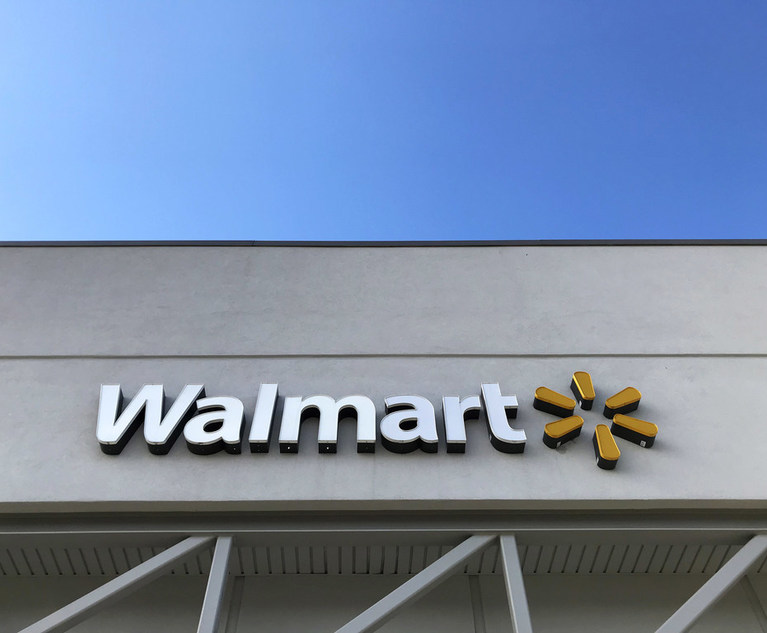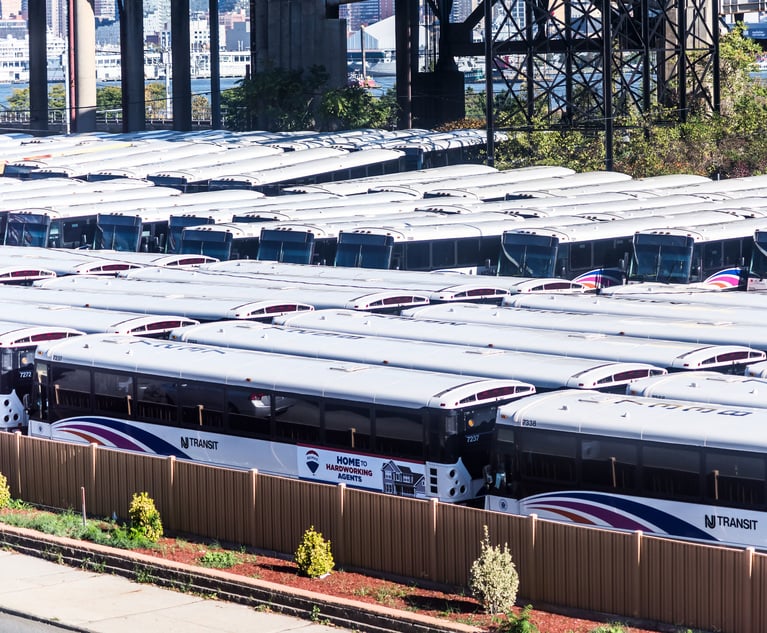Federal Judge Sides With Walmart on Injury Claim Over Motorized Shopping Cart
"Generally, merely providing shopping carts as a self-service equipment does not alone increase the risk of a dangerous condition to warrant application of the mode of operation rule," Judge William J. Martini said. "Rather, application of the mode of operation rule requires that some aspect of the store's self-service operation created a substantial risk of injury."
December 01, 2022 at 11:28 AM
4 minute read
 Walmart store – Photo: Diego M. Radzinschi/ALM
Walmart store – Photo: Diego M. Radzinschi/ALM A federal judge in New Jersey granted summary judgment to Walmart in a personal injury suit, finding that the mode of operation rule does not apply to a woman's claim for injuries allegedly caused by another shopper operating a motorized cart.
According to the Nov. 29 opinion by U.S. District Judge William J. Martini of the District of New Jersey, plaintiff Talia Pena was injured while shopping in a Secaucus Walmart store. Pena bent over to smell body sprays on a bottom shelf near the self-checkout lanes when an unidentified female drove a motorized cart into her, causing her injuries. Pena alleged that the female driver could not see in front of her because she had paper products stacked so high.
Pena filed a negligence action in state court on Sept. 11, 2019, which was removed to federal court based on diversity jurisdiction. Martini wrote in his opinion that, in order to hold a business owner liable, a plaintiff ordinarily must demonstrate that "the defendant had actual or constructive knowledge of the dangerous condition that caused the accident." But under the mode of operation rule, according to Martini, a plaintiff need not prove actual or constructive notice.
"To invoke that rule, the plaintiff must show there was a 'reasonable probability' that the dangerous condition would occur 'as the result of the nature of the business, the property's condition, or a demonstrable pattern of conduct or incidents,'" Martini said, citing Bozza v. Vornado and Layden v. Target.
"Generally, merely providing shopping carts as a self-service equipment does not alone increase the risk of a dangerous condition to warrant application of the mode of operation rule," Martini said. "Rather, application of the mode of operation rule requires that some aspect of the store's self-service operation created a substantial risk of injury."
Martini stated that Pena has not identified any evidence to support her contention that Walmart's practice of providing motorized shopping carts, as opposed to nonmotorized carts, is an aspect of the store's self-service operation that creates a substantial risk of injury. The judge additionally stated that Pena offered no evidence that Walmart invited overstuffing carts by supplying motorized carts.
And finally, Martini dismissed Pena's contention that the mode of operation applies because her injury occurred in a self-service location identical to one in Nisivoccia v. Glass Gardens. In that case, the New Jersey Supreme Court held that the mode of operation rule applied.
"However, the mode of operation rule requires a 'nexus between self-service components of the defendant's business and a risk of injury in the area where the accident occurred,'" Martini said. "Thus, in Nisivoccia, the mode of operation rule was applicable, not merely due to where the injury occurred, but because the injury occurred in a location of the store where customers selected and bagged loose grapes that 'are reasonably likely to fall to the ground during customer or employee handling' creating a dangerous condition."
Martini found that Pena did not show any nexus between the self-service component of providing motorized carts and the risk of injury near the checkout area. The judge concluded that the mode of operation rule is not applicable here and, therefore, she must prove constructive notice to establish liability. Pena, according to Martini, did not provide any evidence of how long the customer had the overstuffed cart prior to her injury.
Martini concluded Walmart had no constructive notice of the condition and therefore granted summary judgment to the defense.
Counsel to Pena, solo practitioner George Rios, and counsel to Walmart, Floyd G. Cottrell of Cottrell Solensky, did not immediately respond to a request for comment.
NOT FOR REPRINT
© 2025 ALM Global, LLC, All Rights Reserved. Request academic re-use from www.copyright.com. All other uses, submit a request to [email protected]. For more information visit Asset & Logo Licensing.
You Might Like
View All
Seton Hall Escapes COVID-19 Wrongful Death Suit After Student Found Dead in Dorm
4 minute read


$2.85 Million Settlement Reached for Pedestrian Killed by Clifton Police Department Car
2 minute readTrending Stories
- 1'It's Not Going to Be Pretty': PayPal, Capital One Face Novel Class Actions Over 'Poaching' Commissions Owed Influencers
- 211th Circuit Rejects Trump's Emergency Request as DOJ Prepares to Release Special Counsel's Final Report
- 3Supreme Court Takes Up Challenge to ACA Task Force
- 4'Tragedy of Unspeakable Proportions:' Could Edison, DWP, Face Lawsuits Over LA Wildfires?
- 5Meta Pulls Plug on DEI Programs
Who Got The Work
Michael G. Bongiorno, Andrew Scott Dulberg and Elizabeth E. Driscoll from Wilmer Cutler Pickering Hale and Dorr have stepped in to represent Symbotic Inc., an A.I.-enabled technology platform that focuses on increasing supply chain efficiency, and other defendants in a pending shareholder derivative lawsuit. The case, filed Oct. 2 in Massachusetts District Court by the Brown Law Firm on behalf of Stephen Austen, accuses certain officers and directors of misleading investors in regard to Symbotic's potential for margin growth by failing to disclose that the company was not equipped to timely deploy its systems or manage expenses through project delays. The case, assigned to U.S. District Judge Nathaniel M. Gorton, is 1:24-cv-12522, Austen v. Cohen et al.
Who Got The Work
Edmund Polubinski and Marie Killmond of Davis Polk & Wardwell have entered appearances for data platform software development company MongoDB and other defendants in a pending shareholder derivative lawsuit. The action, filed Oct. 7 in New York Southern District Court by the Brown Law Firm, accuses the company's directors and/or officers of falsely expressing confidence in the company’s restructuring of its sales incentive plan and downplaying the severity of decreases in its upfront commitments. The case is 1:24-cv-07594, Roy v. Ittycheria et al.
Who Got The Work
Amy O. Bruchs and Kurt F. Ellison of Michael Best & Friedrich have entered appearances for Epic Systems Corp. in a pending employment discrimination lawsuit. The suit was filed Sept. 7 in Wisconsin Western District Court by Levine Eisberner LLC and Siri & Glimstad on behalf of a project manager who claims that he was wrongfully terminated after applying for a religious exemption to the defendant's COVID-19 vaccine mandate. The case, assigned to U.S. Magistrate Judge Anita Marie Boor, is 3:24-cv-00630, Secker, Nathan v. Epic Systems Corporation.
Who Got The Work
David X. Sullivan, Thomas J. Finn and Gregory A. Hall from McCarter & English have entered appearances for Sunrun Installation Services in a pending civil rights lawsuit. The complaint was filed Sept. 4 in Connecticut District Court by attorney Robert M. Berke on behalf of former employee George Edward Steins, who was arrested and charged with employing an unregistered home improvement salesperson. The complaint alleges that had Sunrun informed the Connecticut Department of Consumer Protection that the plaintiff's employment had ended in 2017 and that he no longer held Sunrun's home improvement contractor license, he would not have been hit with charges, which were dismissed in May 2024. The case, assigned to U.S. District Judge Jeffrey A. Meyer, is 3:24-cv-01423, Steins v. Sunrun, Inc. et al.
Who Got The Work
Greenberg Traurig shareholder Joshua L. Raskin has entered an appearance for boohoo.com UK Ltd. in a pending patent infringement lawsuit. The suit, filed Sept. 3 in Texas Eastern District Court by Rozier Hardt McDonough on behalf of Alto Dynamics, asserts five patents related to an online shopping platform. The case, assigned to U.S. District Judge Rodney Gilstrap, is 2:24-cv-00719, Alto Dynamics, LLC v. boohoo.com UK Limited.
Featured Firms
Law Offices of Gary Martin Hays & Associates, P.C.
(470) 294-1674
Law Offices of Mark E. Salomone
(857) 444-6468
Smith & Hassler
(713) 739-1250






